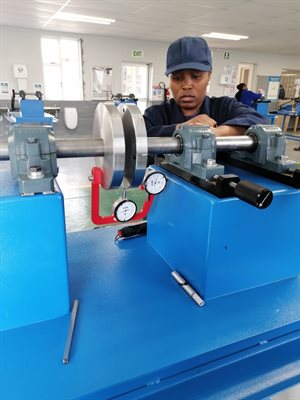
Top stories



ESG & Sustainability#BudgetSpeech2026: SRD grant unchanged, other Sassa social grants see hike
3 hours



More news







ESG & Sustainability
South Africa’s carbon tax should stay: climate scientists explain why













After meeting the Quality Council for Trades and Occupations (QCTO) requirements in the implementation of the Occupational Certificates in rigging and mechanical fitting, 34 of the first cohort of 50 False Bay TVET College CoS apprentices passed the trade test, resulting in an overall 68% pass rate.
Two of the four female apprentices in rigging and three of the six female apprentices in mechanical fitting passed on their first attempt (a 50% first attempt pass rate). The apprentices who were unsuccessful have started preparations for their second attempt to complete the trade test.
Newly trade-tested mechanical fitter Nondumiso Mtshali says, “False Bay TVET College showed me a whole other side of mechanical engineering. At first it wasn’t easy to participate in a male-dominated industry and I was under a lot of pressure to succeed. But thanks to the kind lecturers and the individual projects we did, I upgraded my hand skills and it has driven me to be a proud qualified artisan. I am no longer afraid of working in male-dominated industries.”
Mechanical fitting facilitator Solly Mato says, “The unsuccessful apprentices will have an opportunity to complete their second attempt and I am certain we will reach 100% pass rate, as I believe they are all competent, but the nerves got in the way. The CoS dual system of teaching and learning has yielded such positive results throughout the programme and I strongly believe we should have all our engineering programmes rolled out in this manner.”
This trade test was not only a milestone for the college, but also for the Department of Higher Education and Training that spearheaded the CoS to address the demand for priority trades and the building of the capacity of the public TVET College system to deliver trade qualifications with employer partners.
The priority trades are being delivered through the dual system approach, whereby students move between the college and a workplace over the duration of their period of study. The CoS programme aims to significantly increase the quality of artisans trained, beyond the employer partners’ expectations.